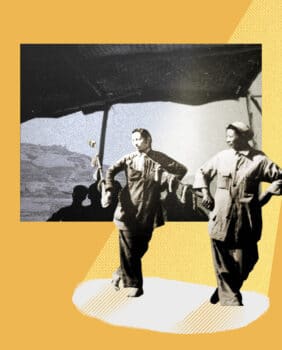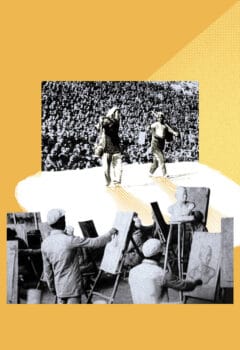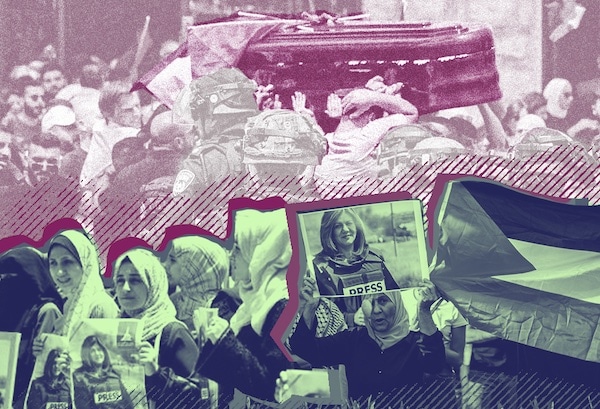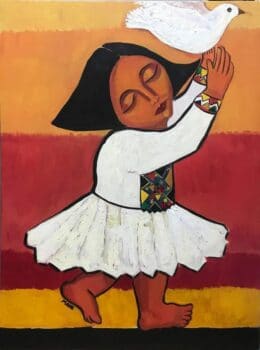Dear friends,
Greetings from the desk of Tricontinental: Institute for Social Research.

Front: Actors of a Beijing opera troupe perform. Back: Drama students of the Lu Xun Academy of Arts (also known as Luyi) rehearse a play in a structure they built themselves. (Photo: Yan’an Red Cloud Platform [延安红云平台])
After Abu Aqleh’s death, the Israeli military raided her home in occupied East Jerusalem, where they confiscated Palestinian flags and attempted to prevent mourners from playing Palestinian songs. At her funeral on 13 May, the Israel Defence Forces attacked the massive turnout of family and supporters–including her pallbearers–and grabbed Palestinian flags held by the crowd. The murder of Abu Aqleh, who had been a highly respected journalist for Al Jazeera since 1997, and the violence by the Israeli forces at her funeral reinforce the apartheid nature of Israel’s occupation of Palestine. Palestinian leader Dr Hanan Ashrawi tweeted that the attack on Palestinian flags, posters, and slogans exposes ‘the insecurity of the oppressor’. The assault on these cultural icons, Ashwari went on to explain, shows Israelis’ ‘fear of our symbols, fear of our grief & anger, fear of our existence’.
The raid that Abu Aqleh was covering when she was killed took place in Jenin, the home of Palestine’s remarkable Freedom Theatre. On 4 April 2011, Juliano Mer-Khamis, one of the theatre’s founders, was shot dead not far from where Abu Aqleh was killed. ‘Israel is destroying the neurological system of [Palestinian] society’, Mer-Khamis said, and this neurological system ‘is culture, identity, communication … We have to stand up again on our feet’, he said. ‘We are now living on our knees’.
Eight decades ago, in the heart of China, hundreds of Chinese intellectuals and artists from cities such as Shanghai gathered in Yan’an, which had become a red base for the Communist Party of China (CPC). In 1942, in and around the caves of this city, a serious discussion took place about the paralysis of Chinese culture in the face of three serious challenges: the sclerotic nature of the Chinese feudal system, the viciousness of Western-led imperialism, and the harshness of the Japanese fascist occupation. Cultural workers had to confront these facts of history as well as the historical tasks that they presented. In Yan’an, the debate circled around the confounding assertion that artists could work without confronting the major historical processes of our time. Imagine, for example, a Palestinian artist who works today without being gripped by the force of Israeli apartheid.

Top: A Luyi choir rehearses the Yellow River Cantata. Bottom: Literature students travel to the battle front in northwest Shanxi.
(Photo: Yan’an Red Cloud Platform [延安红云平台](
Artists root their imagination in their lived experiences. The Freedom Theatre in Jenin does not perform plays that are a mirror of café life in Tel Aviv or New York; their plays go deep into the imagination of occupied Palestine. In Yan’an, our dossier explains, ‘urban intellectuals … had to go through their own transformation in order to close the gap between themselves and the peasant masses. This transformation was at the heart of the Yan’an Forum … together, they could turn into an effective political force’.
On 23 May 1942, Mao took the floor at the Yan’an Forum to offer his concluding remarks to the artists and intellectuals that had left cities such as Shanghai and made their way into the interior. Here, Mao said, new forms of life were being created, a new buoyancy that straightened the spines of the people and produced new forms of social life. ‘To arrive in a base area’, Mao said, ‘is to arrive in a period of rule unprecedented in the several thousand years of Chinese history, one where workers, peasants, and soldiers, and the popular masses hold power … the eras of the past are gone forever and will never return’. He meant that the imagination must be stretched to tell stories of and for the newly upright Chinese people. The purpose of art, the intellectuals at Yan’an argued, is to be relevant to these major historical events.
To make his point, Mao quoted the writer Lu Xun (1881–1936), who understood these changes and reflected on them in his poetry:
Fierce-browed, I coolly defy a thousand pointing fingers,
Head-bowed, like a willing ox I serve the children.
Mao described the enemy, these ‘thousand pointing fingers’, as the vampirish imperialists and cadaverous feudal landlords. The ‘children’ were the working classes, the peasantry, and the popular masses. Lu Xun’s words show that the artist–the ‘willing ox’–must never submit to the old granite block of oppression, Mao explained; he or she must be willing to accompany the people in their struggle for freedom.
It is the struggle that enabled the popular masses to stand upright, to refuse to bow down to the centuries of humiliation of seeing their labour subordinated to the accumulation of wealth by the elites. Artistic practice and intellectual activity must reflect these broad changes which are present today in China’s mass campaign to abolish absolute poverty, in Indian farmers’ refusal to submit to the Uberisation of their livelihoods, in South African shack dwellers’ bravery to stand firm against political killings, and in the massive mobilisation of Palestinians at the funeral of Shireen Abu Aqleh.
The debates at Yan’an cleared the way for artists and writers to germinate intense cultural activity, to disseminate new ideas into the cultural domain, to lift the conversation from the day-to-day to new horizons, and to create new political spaces and epochs. This cultural work called upon intellectuals and artists to focus on the future, no longer merely concerned with their own temperament (‘art for art’s sake’), to work for a new horizon, and to inaugurate a new humanity. There was no obligation to collapse their work solely into a political project, since that would reduce their capacity to go beyond the dilemmas posed by the present. Artists and intellectuals needed to support movements, but also to retain the space to create a passionate fervour in society that could fuel a new culture.
Mao’s interventions at Yan’an made it clear that intellectual and artistic activity would not by themselves change the world. Artists and intellectuals allude to reality, draw attention to certain problems, and provide an understanding of them. But art alone cannot remedy all problems. For that, it is necessary to turn to the organisations and movements that churn society into something new. If art forms must carry the enormous burden of political theory and praxis, they are often diminished. Art must breathe in the sensibilities of the working class and the peasantry and breathe out new cultural propositions. Alongside the tide of humanity that refuses to submit to oppression, this leads us into new possibilities.
Asma Naghnaghiye, a young girl who participated in a Freedom Theatre camp, spoke of the beauty of cultural work ‘In one of the exercises in the theatre I imitated a bird who flies above my neighbourhood and then above Jenin and then above the sea. It was a like a dream’. That dream of the future converts the present into a place of struggle.
Warmly,
Vijay


